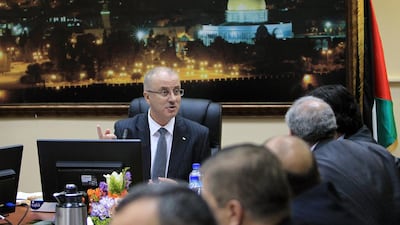AMMAN // The formation of an interim Palestinian government that seeks to end the West Bank's seven-year split from the Gaza Strip is largely a consequence of Hamas's weakened position, say analysts.
The 17-member cabinet, formed on Monday, is mostly composed of loyalists to Palestinian Authority president Mahmoud Abbas, the head of the Islamist group's political rival Fatah.
Hamas's decision to support the cabinet appears rooted in its increasingly difficult circumstances in Gaza, which includes an economy crippled by Israeli and Egyptian pressure.
"This is a major success for Abbas because he basically got everyone where he wanted into this government," said Noam Sheizaf, editor at +972, a liberal online Israeli magazine.
He referred to the holdover of the prime minister and foreign minister in the new cabinet - both of whom are fiercely loyal to Mr Abbas.
For the Palestinian president, whose Palestine Liberation Organisation opposes using violence to end the Israeli occupation, that success includes getting Hamas to sign onto a cabinet that both formally recognises Israel and rejects violence against it.
Although the Islamist group formally calls for Israel's destruction, its leaders have repeatedly said they would back the creation of a Palestinian state.
Israel occupies the land wanted for that state - the West Bank, Gaza Strip and East Jerusalem - and has flooded it with over half a million Jewish settlers.
The administration of United States president Barack Obama and the European Union have also said they will work with the government, despite objections from Israel.
The US, along with Israel and the European Union consider Hamas a terrorist organisation because of its history of suicide attacks and rockets targeting Israelis.
"We are in favour of Palestinian recognition," said the EU's ambassador to the US, Joao Vale de Almeida. "We think it's an important element in the process to bringing a long-term solution - but not at any price. It has to be based on respect for a certain number of values."
Israeli leaders have rejected the cabinet's tentative acceptance by Washington and Brussels, with the communications minister, Gilad Erdan, saying that "American naiveté has broken all records".
He called this an "American capitulation" that could "only damage" the Israeli-Palestinian peace talks that collapsed in April, largely because Israel refused to stop building Jewish settlements on land wanted for a Palestinian state.
Israel's prime minister, Benjamin Netanyahu, also has voiced strong opposition to the agreement.
A New Era
The interim government is the result of a push to implement a stalled, three-year-old reconciliation accord between Hamas and Fatah.
The two fought a brief civil war that ended when Hamas captured Gaza in 2007.
The cabinet of technocrats is tasked with administering Fatah-run areas of the West Bank and the Hamas-controlled Gaza Strip until the factions can decide on a date to hold national elections, which are scheduled to be held at some point next year.
"I think that the sort of isolated, quasi-state regime that Hamas has run in Gaza has run its course, especially after what happened in Egypt," said Mr Sheizaf.
Last summer, the Egyptian military overthrew president Mohammed Morsi, a Muslim Brotherhood member with ideological ties to Hamas.
With backing from Qatar, Mr Morsi helped thaw Hamas's diplomatic isolation by allowing numerous foreign delegations entry into the Israeli-besieged territory, which shares a border crossing with Egypt.
Immediately after his removal, Egypt's military began choking off the territory by destroying the tunnels that supplied it with essentials such as fuel and medicine along with cars and construction material.
Elsewhere, also, Hamas lost political support and crucial funding after it sided with Syrian rebels against its former allies in the Damascus-Tehran-Hizbollah axis.
In 2011, Hamas dismantled its long-standing headquarters in Damascus to protest the killing of thousands of people by the regime of Syrian president Bashar Al Assad.
All of this translated into more pain for Gaza's 1.8 million residents and rising pressure on Hamas, which over the last year struggled to pay the salaries of the 60,000 civil servants in Gaza.
"Hamas is facing some of its most difficult political and economic conditions that they have ever faced," said Mkhaimar Abusada, professor of political science at Gaza's Al Azhar University.
Still, because the group allowed Mr Abbas to take charge in forming the cabinet, Hamas also hedged its bets against the government's failure.
"If this government fails, then it will be Abu Mazen's failure because Abu Mazen formed this government," said Mr Abusada, referring to Mr Abbas by his nickname. "Hamas won't be blamed for a failure."
George Giacaman, a professor at Birzeit University's democracy and human rights programme, said it was possible the agreement would fail because the core issues separating Hamas and Fatah still had not been addressed.
Those issues include how to unite the factions' security forces and whether Hamas would be incorporated into the PLO, as stipulated by the initial Fatah-Hamas unity agreement that was signed by the factions in May 2011.
Israel would oppose the integration of security forces because it co-ordinates with Fatah security in the West Bank.
Moreover, Mr Giacaman said that Washington would likely cut off aid if the Islamist group became part of the PLO.
If anything, he said, the agreement helps relieve Hamas of the burden of attempting to end the Israeli siege on Gaza or paying salaries to its employees. These issues will be the responsibility of the unity government.
"So Hamas is relieving itself of the responsibility of government when it comes to paying salaries and ending the siege, and at the same time they are still in control from the security perspective," Mr Giacaman said.
"From a political standpoint, Hamas hasn't really changed."
hnaylor@thenational.ae
*Additional reporting by the Associated Press

Why Hamas would seek Palestinian unity despite domination of Abbas loyalists in cabinet
Hamas's decision to support the cabinet appears rooted in its increasingly difficult circumstances in Gaza, which includes an economy crippled by Israeli and Egyptian pressure, say some analysts.
Most popular today
8
